M. Vipsanius Agrippa (2)
Marcus Vipsanius Agrippa (64/63-12 BCE): Roman politician, friend of the emperor Augustus.
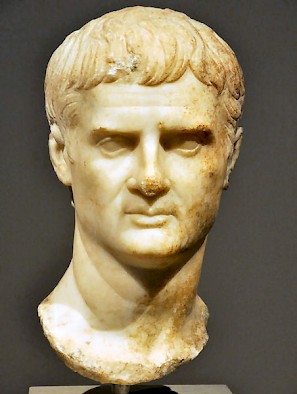
Meanwhile, Mark Antony had reached Gaul and had found an ally, Marcus Aemilius Lepidus, the governor of the country beyond the Alps. By now, Octavian controlled Italy and Caesar's veterans, Lepidus and Antony controlled the northwest, and in the east Caesar's assassins had been able to regroup and were building an army. None of these factions could win the inevitable civil war, and no one was surprised that in the summer of 43, Octavian joined forces with Lepidus and Mark Antony: the Second Triumvirate, which was not a private deal but an official office, recognized by the Lex Titia in November 43.
Immediately, the triumvirs launched a civil war against the murderers of Caesar, who were by now commanded by Marcus Junius Brutus Caepio and Gaius Cassius Longinus. In the battle of Philippi, in October 42, Mark Antony and Octavian defeated their enemies. Maecenas and Agrippa were officers in the victorious army.
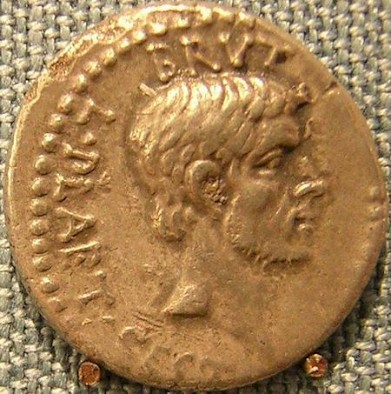
It is only now that Agrippa's career really started. With Octavian, he returned to Italy, leaving Mark Antony to reorganize the east. Octavian, who commanded loyal legions, more or less ordered Lepidus to go to Africa, which was in fact the end of the latter's career. It became clear that the next round of civil wars was to be fought between Antony and Octavian. In 41, Mark Antony's brother Lucius seized the initiative, and a small war broke out in Italy when Octavian asked for reinforcements from Gaul and Lucius Antonius tried to block them. Agrippa -probably acting as legatus, deputy, of Octavian- reopened the way to Gaul by seizing Sutrium. After this, Antonius withdrew to Perugia, where Octavian started to besiege him.
Next year, 40, Agrippa was praetor urbanus, which meant that he was responsible for the administration of justice in Rome. However, praetors could also perform military duties, and this was of course what Agrippa, who had no experience in the law courts at all, had to do. He was able to repell an army that had to relieve Lucius Antonius, and thereby sealed Perugia's fate. Octavian offered mild terms, and sent his enemy as governor to Spain. Of course the war at Perugia had damaged the relations between Octavian and Mark Antony, but Agrippa was able to negotiate a personal treaty between the two triumvirs; Antony married Octavian's sister Octavia Minor, and Antony's son Antyllus was to marry Octavian's daughter Julia, who was about two years old. The fact that Lepidus was not even asked for advice, illustrates how much power he had lost.
From the spring of 39 to the autumn of >38, Agrippa was governor of Gaul, where he laid the foundations of Roman rule north of the Alps. Until then, the province had been left to its own: it had been conquered by Julius Caesar, but the civil wars had prevented decent administration. This was now to change. First, Agrippa crossed the river Rhine and fought on behalf of the Ubians a war against the Suebians, a Germanic tribe that was notoriously aggressive. After the campaign, Agrippa resettled the Ubians on the west bank of the Rhine, and founded Ara Ubiorum, a city that was to become better known as Cologne. At the same time, a part of the tribe of the Chatti migrated to the Lower Rhine and Waal, where it mixed with the natives and accepted their name: Batavians, "people of the fertile wetlands". Their capital was Batavodurum, modern Nijmegen.
Agrippa also built several roads: one from the Gallic capital Lugdunum (Lyon) to Aquitania in the west (where a rebellion was suppressed in 38), one to the Upper Rhine in the northeast, and one to Langres (the capital of the Lingones) in the north, where it divided into two branches: to the northwest, to Reims and the Channel, and to the north, to Trier and Cologne. The presence of Italian wine amphoras
In 37, Agrippa was consul - a sign of the times. He was not from a senatorial family, had never been quaestor, had never been a real praetor, and was about twenty-six years old, whereas a consul officially had to be at least forty-three. But Agrippa was a military man and a close friend of Octavian, and that explained everything. (Agrippa's colleague was Lucius Caninius Gallus.)
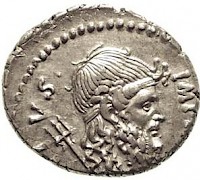
Meanwhile, a new war had broken out. During the conflict between the triumvirs and Caesar's murderers, a son of Pompey the Great, Sextus Pompeius, had seized power on Sicily and had started to gather senators who wanted to overthrow Octavian, Lepidus, and Mark Antony. The island had become a pirate's nest, and Sextus Pompeius threatened to cut off the food supply of Rome. He was a dangerous enemy, and when Octavian had decided to attack him in 38, he had been defeated. After this, Sextus Pompeius had proclaimed that he was protected by the sea god Neptune.
Agrippa was now asked for help. With Gaius Maecenas he concluded a treaty with Mark Antony, who would offer a fleet and would in return receive an army for a campaign against the Parthians. Agrippa also built a new port near Puteoli (west of Naples), and used the Avernian Lake behind this town to train marines. In this same year, Agrippa married to Caecilia Attica (a daughter of the Atticus to whom Cicero addressed many letters). Attica was to be mother of Agrippina, who later married to the future emperor Tiberius.
In 36, Agrippa's fleet was ready to strike and, employing a new type of harpoon, defeated Sextus Pompeius at Mylae and Naulochus (3 September 36). This was not only the end of the last senatorial stronghold, but also of Lepidus, because Octavian proceeded to strip him of his powers. He was left alive because he was Rome's pontifex maximus; the powerless triumvir would reach a venerable old age. It shows that Octavian already felt strong enough to pardon his opponents. He could afford to be generous, also to his allies: Agrippa received country estates on Sicily and -on 13 November- a corona rostrata ("naval crown"). Agrippa was either the first or the second to receive this type of military decoration.
From now on, only Mark Antony -who experienced military problems in the east- and Octavian remained as rulers in the Mediterranean. It was obvious that they would one day go to war. In 35-34, Octavian crossed the Adriatic to pacify Illyricum, an operation that ensured that the Illyrians would not support Mark Antony. Other motives was that troops could be trained, that an overland route to Epirus, Macedonia, and Greece would be created, and that Octavian could gain some military prestige. Although this Dalmatian War was not without danger, and Agrippa had to rescue Octavian on one occasion (more...), in the end, the operation was successful.
The spoils of the Dalmatian War, the return of normalcy on the seas surrounding Sicily, and the restored food supply of Rome were celebrated in 33, when Octavian was consul for the second time and Agrippa was aedile. In this capacity, Agrippa expelled all astrologers from Rome and was responsible for a large project of urban renewal. Three new aqueducts were built (the Aqua Julia, Aqua Marcia, and Aqua Virgo), sewers were restored, a Bathhouse constructed, streets paved, and festivities celebrated. He also founded a corps of 250 slaves who were to maintain the sewers and aqueducts.
Agrippa's project was clearly important to Octavian, because it was actually a strange request he had made to Agrippa. He was a former consul, and in a normal career (cursus honorum), former consuls never became aediles. It shows that Octavian simply wanted to have things done, needed a capable man - an interim manager, we would say - and was not willing to have things done as they traditionally ought to be done.
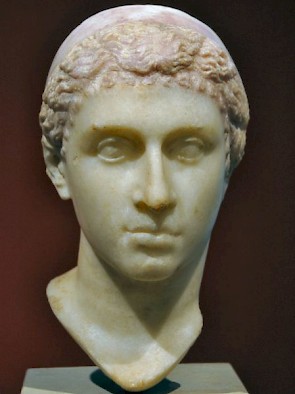
On the last day of March 32, Agrippa's father-in-law, Atticus, died. Agrippa inherited several estates in Greece, but could not enjoy them, because the war with Mark Antony had in the meantime broken out. He had sent his wife Octavia away, had married the Egyptian queen Cleopatra VII Philopator, and it had been discovered (in a perhaps forged document) that Antony wanted to give Roman land to Cleopatra. This was treason and offered Octavian a reason to go to war.
Cleopatra and Antony decided to strike first and occupied Greece. From here they wanted to cross to Italy, but their advance was halted when the fleet of Octavian sailed to the east and landed in pacified Illyricum. He continued his march to the south and established a bridgehead in southern Epirus. At the same time, Agrippa sailed to southern Greece and cut off Antony's lines of communciation. Having done this, he sailed to the north, established other important bases (a/o at Patras) and in the end, all Antony's troops were isolated at Actium, where hunger started to wear out his men. This forced him to fight and break through to blockade.
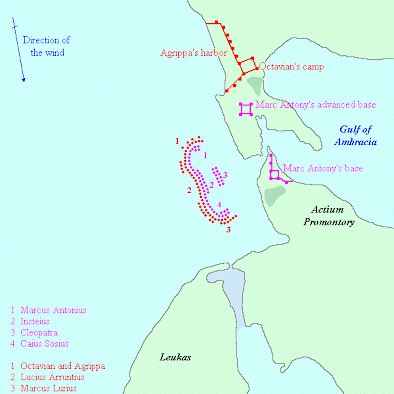
The decisive battle was fought on 2 September 31. Octavian, who knew that Agrippa was the better military leader, ordered his friend to fight, but Agrippa was unable to prevent Antony and Cleopatra from sailing back to Egypt. In fact, Antony had won the battle -after all, he wanted to break out- but he had lost his army and a large part of his fleet. It was clear that he had also lost the campaign, and Antony's soldiers immediately surrendered to Octavian, who offered them favorable terms and pursued his enemies to Egypt. Here, Antony and Cleopatra committed suicide.